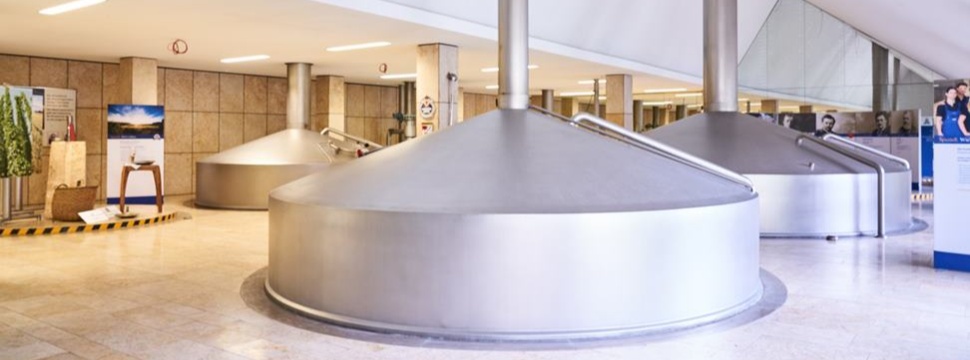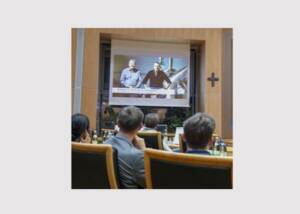Energy supply in crisis
News General news
Brewing beer independently of natural gas: Schneider Weissbräu brews sustainably with wood chips from the region and uses energy-efficient heating plant

Many breweries rely on gas to supply their production processes with heat. Government rationing, continued reductions or even a halt in gas supplies would therefore have dramatic consequences. On the one hand, beer brewing would become unprofitable with stagnating high energy prices, and on the other hand, the planned brewing volumes could not be secured. While most breweries are currently looking for alternatives and short-term solutions, the private Weissbierbrauerei Schneider G. Schneider & Sohn GmbH in Munich/Kelheim already took a different path 15 years ago: to ensure a future-proof supply, the beer producer afforded itself a new energy centre with a biomass heating plant. Natural forest chips from the region serve as the energy source. The sustainable energy concept was implemented by Gammel Engineering from Abensberg. The energy plant covers the heat demand for the filling plant, brewhouse, building heating and the restaurant. The decision made at the time is paying off right now, as the brewery is not dependent on fossil fuels. The Schneider wood energy concept could therefore serve as a model for many other breweries.
Until 2007, the Schneider brewery still obtained the heat it needed from oil - a finite and price-variable resource. To break away from this uncertain supply, the management looked for an alternative. "The simpler and much more convenient method would have been the technically less complex conversion to gas," explains master brewer Josef Lechner in reference to the search for a new energy supply. "But even that would have made us more dependent again." By switching to a sustainable resource, such as wood chips, Schneider Weisse was the pioneer in the industry. A comparable approach had not been common there before.
Although the price of gas was very low at the time, which would have led to a quick, low-cost standard solution, for Georg Schneider and his team the focus was not only on the energy price: "We made a conscious decision in favour of sustainability and the long-term benefits it brings - and we are convinced of the philosophy," says the head of the brewery today. In the long term, the move should put the brewery on a carbon-neutral path. In contrast to gas, oil and coal, which in addition to their poor carbon footprint also have to be transported to their destination at great expense, the renewable energy source now used by the brewery comes from the immediate vicinity: the wood chips are produced by forest farmers near Kelheim. "So we leave the added value in the region. The social aspect is very important to us," Lechner emphasises.
New energy centre and biomass cogeneration plant
The Abensberg engineers, who have extensive know-how in the field of sustainable energy concepts, advised the brewery during the entire planning and implementation phase. At the heart of the new concept is a modern energy centre and a biomass heating plant for processing the wood chips. Controlled combustion produces process heat in the form of hot water at 160°C, which is fed to the various process stations on the brewery premises via a special piping system. "Our wood heating system has enabled us to replace about 720,000 litres of heating oil per year, which corresponds to a saving of 2,000 tonnes of CO2 annually. Instead, about 2,600 t of wood chips from the region are utilised during the same period," says Dieter Lichtenberger, authorised signatory at Gammel Engineering.
Gammel Engineering is very familiar with the supervision and implementation of projects of this magnitude. Thus, in addition to the design and installation of the power plant, the engineers' tasks also included the connection of the refrigeration and CIP systems to the energy centre. In the process, the team attached great importance to the use of state-of-the-art materials and technology as well as to a maintenance-friendly implementation. Since then, the brewery has been able to supply almost 95% of its entire operating processes - including bottling, brewhouse and building and restaurant heating - with heat from the renewable raw material forest wood.
Kelheim energy concept as a model for other beverage producers
The implementation of the project, which involved a technical investment volume of about 1.3 million euros, lasted from May 2007 to March 2008. In the process, the system quickly paid for itself through the subsequent energy-efficient supply and savings in price-unstable resources. In addition, the strategic decision taken 15 years ago has given Schneider Brewery some advantages today: "We are virtually no longer subject to the global energy market. And not only when you think of the current gas and oil prices. But above all because we are not dependent on gas supplies," argues brewery boss Georg IV Schneider. The managing director is also thinking quite specifically about a possible gas shortage. Many of his competitors, most of them small and medium-sized enterprises, are threatened with loss of production without gas. An energy concept like the one implemented by Gammel Engineering in Kelheim could therefore serve as a model for other breweries and beverage producers. After all, an independent energy supply based on renewable energies ensures that value creation remains in the region.
We would make this switch to woodchip heating again today. Now it shows that the decision was right," says Schneider. Therefore, Michael Gammel, managing director of the energy engineering company of the same name, also recommends to other breweries that still burn natural gas: "Don't wait any longer, but follow your brewer-president on the path to sustainable beer production in order to become independent of global energy price spirals." So in 2022 there will be two reasons for Brauerei Schneider to celebrate: 150 years of brewing tradition and a successful and sustainable energy supply.










